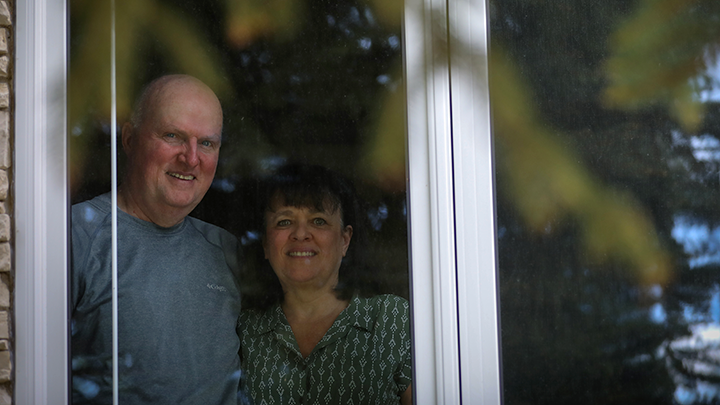
June 3, 2020

D’Arcy and Vicki Duquette understand first-hand the challenges of Intensive Care Unit-related delirium, after D’Arcy experienced complications following surgery.
Story by Greg Harris | Photo by Leah Hennel
Calgary resident and former Intensive Care Unit (ICU) patient D’Arcy Duquette won’t get on an airplane unless he’s guaranteed an aisle seat.
Experiencing anxiety in situations where he feels closed in is one of the lasting impacts of the delirium he experienced during a 71-day stint in hospital following complications from surgery.
“Being restrained so I wouldn’t pull out any of the lines that were attached to me was the most emotional part,” Duquette says of his ICU experience. “I was hallucinating while I was regaining consciousness, and being restrained really traumatized me. To this day it still has an impact on me.”
ICU-related delirium is a common brain dysfunction among the critically ill. It can occur because of the type of medications used, time spent getting breathing assistance from a ventilator, disturbed sleep patterns and being immobilized.
On June 3, the Health Quality Council of Alberta (HQCA) recognized the Critical Care Strategic Clinical Network (SCN) and all 20 of AHS’ ICUs with a Patient Experience Award for improving the patient experience by reducing ICU-related delirium.
“The Delirium Initiative that the Critical Care Strategic Clinical Network launched in 2016 has made a huge difference for patients,” says Jeanna Morrissey, manager of the SCN and one of the leads for the project.
“Overall, we’ve reduced the number of days adult ICU patients experience delirium by 10 per cent, which translates to faster recoveries, fewer complications and less likelihood of long-term cognitive impairments,” she adds.
The ICU Delirium Initiative, which involved 17 adult and three pediatric ICUs across the province, also produced other significant improvements:
By regularly assessing patients’ sedation and agitation levels, care teams are able to ensure patients are not over-sedated, are more awake, cognitively engaged, and able to mobilize — all of which help prevent delirium and improve patient experience.
“Every adult or child admitted to an ICU now receives care that is consistent with delirium best practices, regardless of where in Alberta they receive their care,” Morrissey says. “Albertans can feel confident that they, or their loved one, is receiving the best care — and know that the ICU Delirium Initiative has reduced the likelihood of developing delirium while in an Alberta ICU.”
She adds that a hallmark of the initiative is the deep involvement of the Critical Care SCN’s Patient and Family Advisor Working Group, which co-designed patient and family resources.
“We couldn’t have done any of this without understanding the perspectives of patients like D’Arcy and his wife,” says Morrissey.
Duquette’s wife, Vicki, was also impacted by her husband’s ICU experience.
“One of the things I struggled with was coming in in the morning and seeing the terror in his eyes at being restrained,” she recalls. “Because he had a tracheotomy, we had to try to communicate with our eyes.
“It’s easy to treat someone in hospital according to a textbook, but unless you’ve experienced being in a hospital with a loved one who has delirium, it’s hard to totally understand,” she says.
Because the Delirium Initiative has reduced ICU-related delirium overall, patient restraints are used less frequently.
D’Arcy welcomes all of the improvements that have been made and is particularly grateful for the work of Morrissey and Delirium Initiative practice lead Heather Colaco, as well as Critical Care SCN leaders Nancy Fraser and Sherri Kashuba.
“They all listen when you speak; they are so committed to making positive changes for patients, it amazes me how considerate they are,” he says.
D’Arcy went on to join HQCA’s Patient and Family Advisory Committee, which selects the recipients of the Patient Experience awards. He says he excused himself from those deliberations, given his background as a Patient and Family Advisor for the Critical Care SCN.
HQCA’s Patient Experience Awards were established by the HQCA and its Patient and Family Advisory Committee to recognize and spread knowledge about initiatives that improve the patient’s overall experience in accessing and receiving healthcare services.
Read about another 2020 HQCA Patient Experience Award winner: Remote monitoring of electronic cardiac devices.